Windows 10 is set to check for updates automatically unless you disable this feature manually. There is the policy Specify deadline before auto-restart for update installation which allows specifying the deadline in days before the OS automatically restarts outside of active hours. The deadline can be individually set for quality and feature updates.
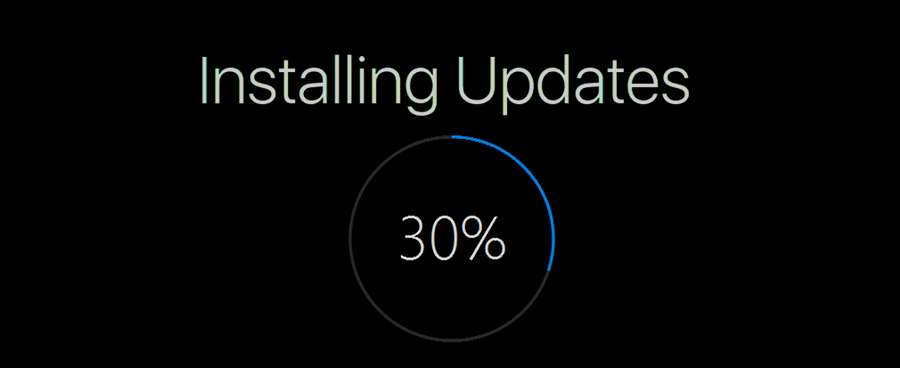
Windows 10 comes with a special service called "Windows Update" which periodically downloads update packages from Microsoft's servers and installs those updates except for metered connections. If it is not disabled in Windows 10, the user can manually check for updates at any moment.
Advertisеment
The update that is offered to a device depends on several factors. Some of the most common attributes include the following.
- OS Build
- OS Branch
- OS Locale
- OS Architecture
- Device update management configuration
In Windows 10, there are two release types: feature updates that add new functionality twice per year, and quality updates that provide security and reliability fixes at least once a month.
The Deadline Before Auto-Restart for Update Installation Policy
When a new update installs, the operating system shows a toast notification that informs the user that their device will restart automatically outside of the Active Hours period (if configured). The user can reschedule a restart using the appropriate options in Settings > Update & recovery > Windows Update.
When the policy Specify Deadline Before Auto-Restart for Update Installation allows setting the deadline before the PC will automatically restart to apply updates. The deadline can be set 2 to 30 days past the default restart date. The restart may happen inside active hours. If you disable or do not configure this policy, the PC will restart according to the default schedule.
Note: Enabling either of the following two policies will override the above policy:
- No auto-restart with logged on users for scheduled automatic updates installations.
- Always automatically restart at scheduled time.
If you enable the Specify Deadline Before Auto-Restart for Update Installation policy, please keep in mind that it can be overridden by the policy Specify Deadlines for Automatic Updates and Restarts.
If you are running Windows 10 Pro, Enterprise, or Education edition, you can use the Local Group Policy Editor app to configure the options with a GUI, as described below. Otherwise, you can apply a Registry tweak.
To Set Deadline Before Auto-Restart for Update in Windows 10,
- Press Win + R keys together on your keyboard and type:
gpedit.msc
- Group Policy Editor will open. Go to Computer Configuration \ Administrative Templates \ Windows Components \ Windows Update.
- On the right, double-click the policy option Specify deadline before auto-restart for update installation.
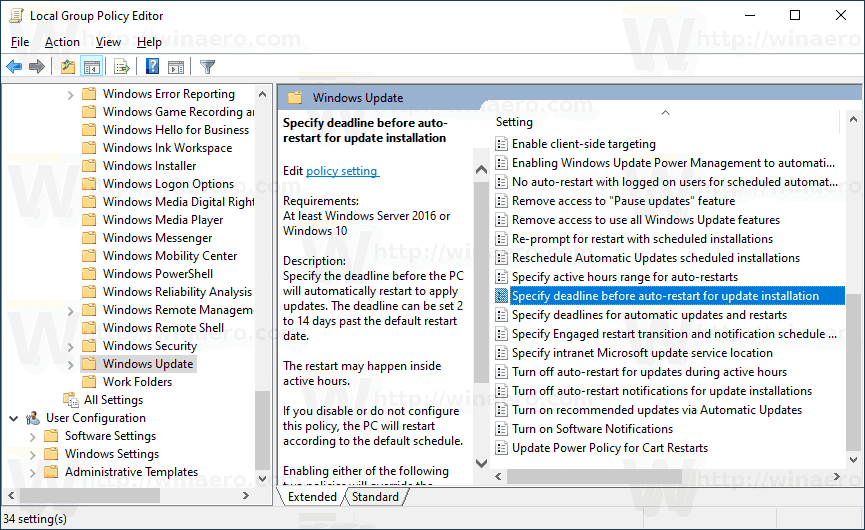
- Select Enabled to turn on the policy.
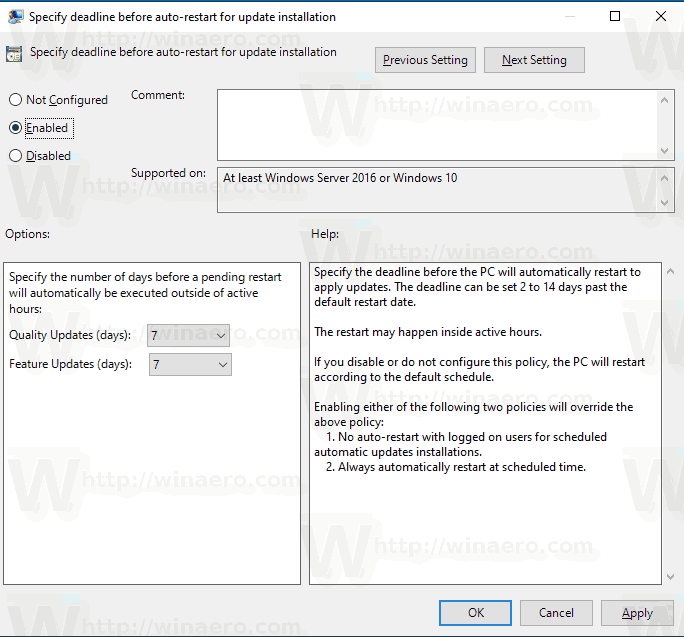
- Select 2 to 30 days in the Quality updates drop down list to set the number of days you want for its deadline.
- Select 2 to 30 days in the Feature updates drop down list to set the number of days you want for its deadline.
You are done.
Alternatively, you can configure this option with a Registry tweak. Here is how.
Set Deadlines with a Registry Tweak
- Open Registry Editor.
- Go to the following Registry key:
HKEY_LOCAL_MACHINE\SOFTWARE\Policies\Microsoft\Windows\WindowsUpdate
Tip: See how to jump to the desired Registry key with one click. If you do not have such a key, then just create it.
- Here, modify or create a new 32-bit DWORD value SetAutoRestartDeadline. Note: Even if you are running 64-bit Windows, you still need to use a 32-bit DWORD as the value type. Set it to 1 to enable the policy.
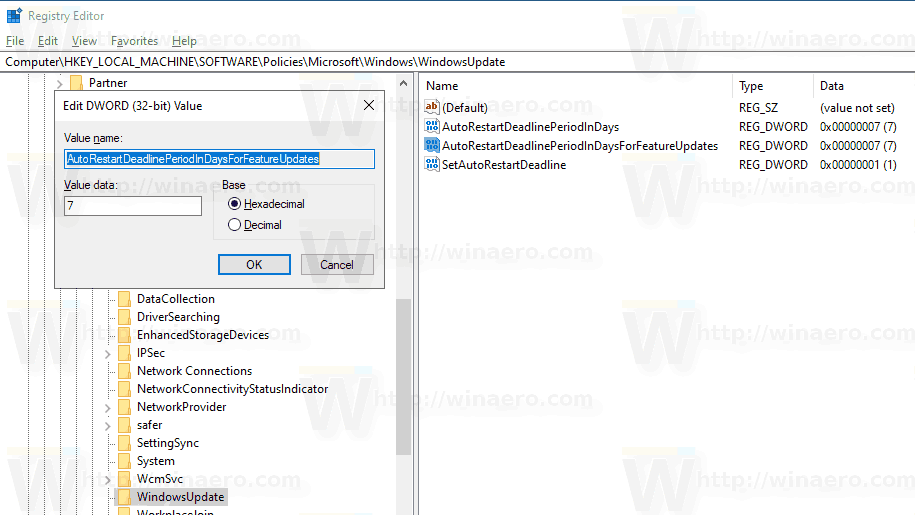
- Modify or create a new 32-bit DWORD AutoRestartDeadlinePeriodInDays, and set it to a value from 2 to 30 in decimals for days you want to set for a Quality updates deadline.
- Modify or create a new 32-bit DWORD AutoRestartDeadlinePeriodInDaysForFeatureUpdates, and set it to a value from 2 to 30 in decimals for days you want to set for a Feature updates deadline.
- To make the changes done by the Registry tweak take effect, restart Windows 10.
You are done.
Note: Delete all the mentioned five values to undo the change. Restart the OS after that.
To save your time, you can download the following ready-to-use Registry files.
By applying the provided tweak, you will set a 7 day deadline for both Quality and Feature updates. The undo tweak is included.
That's it.
Support us
Winaero greatly relies on your support. You can help the site keep bringing you interesting and useful content and software by using these options:
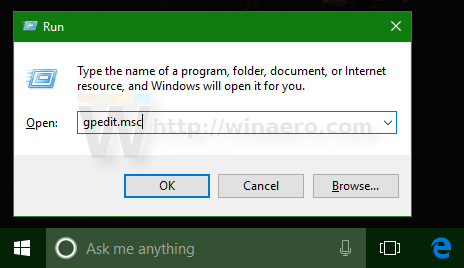

This confuses me, although I do realize we’re talking about Microsoft. I’m aware of people being very upset about forced updates and especially forced restarts that cannot be delayed or halted but I have not seen any outcry over updates that can’t be applied in spite of the user’s wish to have them. Maybe Microsoft is gaslighting all of us? That must be it. ;)
I’m looking at a newly created group policy on my Windows 2019 domain controller. Policy setting does not exist.